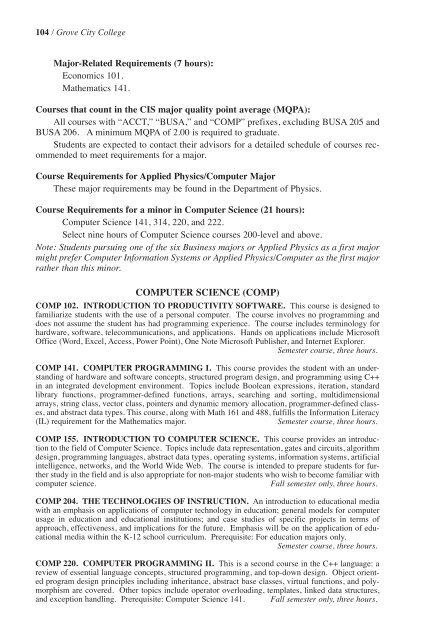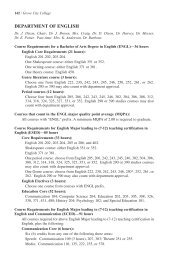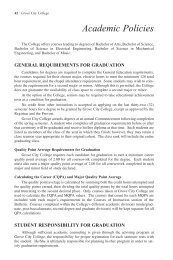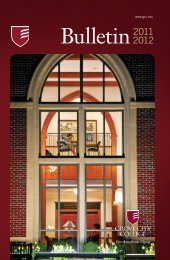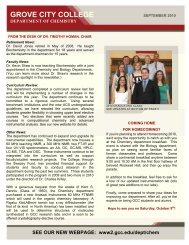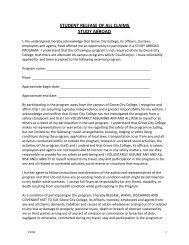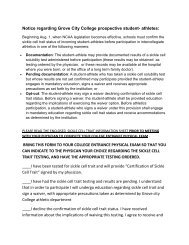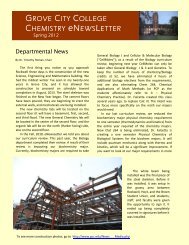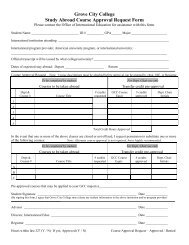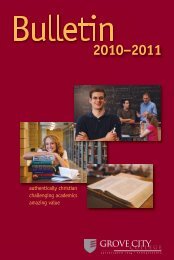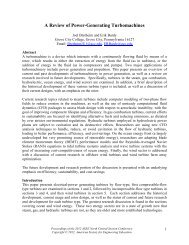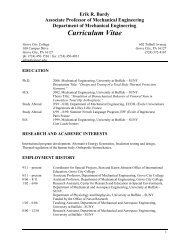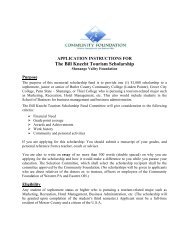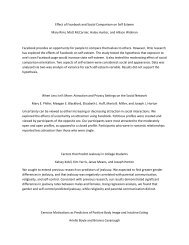2009–2010 - Grove City College
2009–2010 - Grove City College
2009–2010 - Grove City College
You also want an ePaper? Increase the reach of your titles
YUMPU automatically turns print PDFs into web optimized ePapers that Google loves.
104 / <strong>Grove</strong> <strong>City</strong> <strong>College</strong><br />
Major-Related Requirements (7 hours):<br />
Economics 101.<br />
Mathematics 141.<br />
Courses that count in the CIS major quality point average (MQPA):<br />
All courses with “ACCT,” “BUSA,” and “COMP” prefixes, excluding BUSA 205 and<br />
BUSA 206. A minimum MQPA of 2.00 is required to graduate.<br />
Students are expected to contact their advisors for a detailed schedule of courses recommended<br />
to meet requirements for a major.<br />
Course Requirements for Applied Physics/Computer Major<br />
These major requirements may be found in the Department of Physics.<br />
Course Requirements for a minor in Computer Science (21 hours):<br />
Computer Science 141, 314, 220, and 222.<br />
Select nine hours of Computer Science courses 200-level and above.<br />
Note: Students pursuing one of the six Business majors or Applied Physics as a first major<br />
might prefer Computer Information Systems or Applied Physics/Computer as the first major<br />
rather than this minor.<br />
COMPUTER SCIENCE (COMP)<br />
COMP 102. INTRODUCTION TO PRODUCTIVITY SOFTWARE. This course is designed to<br />
familiarize students with the use of a personal computer. The course involves no programming and<br />
does not assume the student has had programming experience. The course includes terminology for<br />
hardware, software, telecommunications, and applications. Hands on applications include Microsoft<br />
Office (Word, Excel, Access, Power Point), One Note Microsoft Publisher, and Internet Explorer.<br />
Semester course, three hours.<br />
COMP 141. COMPUTER PROGRAMMING I. This course provides the student with an understanding<br />
of hardware and software concepts, structured program design, and programming using C++<br />
in an integrated development environment. Topics include Boolean expressions, iteration, standard<br />
library functions, programmer-defined functions, arrays, searching and sorting, multidimensional<br />
arrays, string class, vector class, pointers and dynamic memory allocation, programmer-defined classes,<br />
and abstract data types. This course, along with Math 161 and 488, fulfills the Information Literacy<br />
(IL) requirement for the Mathematics major. Semester course, three hours.<br />
COMP 155. INTRODUCTION TO COMPUTER SCIENCE. This course provides an introduction<br />
to the field of Computer Science. Topics include data representation, gates and circuits, algorithm<br />
design, programming languages, abstract data types, operating systems, information systems, artificial<br />
intelligence, networks, and the World Wide Web. The course is intended to prepare students for further<br />
study in the field and is also appropriate for non-major students who wish to become familiar with<br />
computer science. Fall semester only, three hours.<br />
COMP 204. THE TECHNOLOGIES OF INSTRUCTION. An introduction to educational media<br />
with an emphasis on applications of computer technology in education; general models for computer<br />
usage in education and educational institutions; and case studies of specific projects in terms of<br />
approach, effectiveness, and implications for the future. Emphasis will be on the application of educational<br />
media within the K-12 school curriculum. Prerequisite: For education majors only.<br />
Semester course, three hours.<br />
COMP 220. COMPUTER PROGRAMMING II. This is a second course in the C++ language: a<br />
review of essential language concepts, structured programming, and top-down design. Object oriented<br />
program design principles including inheritance, abstract base classes, virtual functions, and polymorphism<br />
are covered. Other topics include operator overloading, templates, linked data structures,<br />
and exception handling. Prerequisite: Computer Science 141. Fall semester only, three hours.


